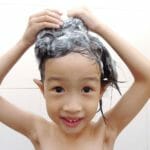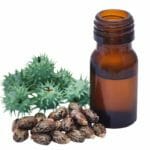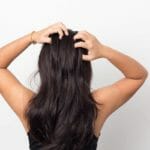Can I use conditioner after ketoconazole shampoo?
At BeautyCaters, our expert team independently curates every recommended product. Purchases through our links may earn us a commission. Explore our transparent selection process.
Want dazzling, smooth hair while getting rid of dandruff? While Ketoconazole shampoo is the ultimate remedy to stubborn dandruff, a conditioner helps you achieve lustrous locks free of frizz. Here comes the million-dollar question: Can I use conditioner after ketoconazole shampoo?
We bring expert insights in this blog post. So, explore it and know if you can condition your way to scalp relief and silky strands.

What is ketoconazole shampoo?
Ketoconazole shampoo is a medicated antifungal hair cleanser that treats scalp and skin issues caused by fungal or yeast infections. It treats scalp conditions such as stubborn dandruff, psoriasis, seborrheic dermatitis, Tinea capitis, and alopecia.
You can buy these shampoos over-the-counter (OTC) or with a doctor’s prescription. To use this shampoo, apply it like a regular shampoo and rinse off as directed.
What does ketoconazole shampoo do?

Ketoconazole shampoo is advertised as a treatment for dandruff, but it can also effectively treat a range of scalp issues.
Treating fungal infections
Fungal infections are the primary source of various scalp issues. Ketoconazole shampoo is the one-stop solution for these issues. It can help to reduce dandruff and itching caused by seborrheic dermatitis, a scalp condition caused by an overgrowth of the Malassezia fungus. It can also help to eliminate psoriatic plaques, flakiness, and redness caused by scalp psoriasis and combat the yeast that often infects these plaques. Furthermore, it can treat tinea capitis, a ringworm-like fungal scalp infection, and tinea versicolor, a skin infection caused by an overgrowth of yeast.
This anti-fungal shampoo not only combats the underlying infection but prevents its recurrence.
Influences on hair loss
Ketoconazole is commonly used to treat infections and seborrheic dermatitis. Some anecdotal evidence suggests that it may have hair growth benefits or reduce hair loss. A small study found that both the 1% and 2% dosages of ketoconazole shampoo have been reported to show hair growth. However, the more potent 2% formulation produces better results if used once every 2-4 days. Excessive use does not yield better results. Medications that maintain the existing hair population are effective for androgenic alopecia.
However, ketoconazole shampoo is only FDA-approved for treating dandruff and seborrheic dermatitis. It cannot be marketed as a hair loss remedy.
Benefits of a hair conditioner

Conditioner isn’t just an extra step – it’s essential for healthy hair. While some people underestimate the need for conditioner in their hair care routine, it plays a vital role in maintaining the health and appearance of your hair. Below are the benefits that conditioners provide to hair.
- Frequent styling and daily wear and tear set the stage for hair damage. Though shampoo thoroughly cleans your scalp and hair, it alone cannot hold the ground. It strips away the natural oils and leave them feeling dry, brittle, and prone to breakage. That is where you need the potent and gentle hair conditioner. Conditioning after shampooing helps replenish the moisture lost and the natural oils stripped off your hair while cleansing.
- Hair conditioner also strengthens each strand with a protective coating that prevents breakage and spilt ends and promotes hair growth. It smoothens the cuticles and makes hair feel healthier, vibrant, softer, silkier, and more manageable to adorn any hairstyle.
Does Ketoconazole shampoo make hair dry?
Besides the impressive goodness, Ketoconazole shampoo has some side effects you should be aware of. One of the most common side effects is dry hair and skin irritation. Ketoconazole shampoo may strip off hair’s natural oil, which leads to abnormal hair texture like dryness and frizz. In some, it may cause itching and irritation, which is curable and not so worrying. Plus, it may also result in hair discoloration and loosening of perms.
These side effects, except dryness, are uncommon. Most people use ketoconazole shampoo without experiencing adverse effects.
Can I Use Conditioner After Ketoconazole Shampoo?

As you know the benefits of using ketoconazole shampoo and conditioner, you might wonder whether it’s safe to use conditioner after this medicated shampoo. It’s essential to consider a few factors before incorporating conditioner into your ketoconazole hair wash routine.
- Time Gap: Ketoconazole shampoo must remain on your scalp for a sufficient duration to combat the underlying scalp issue. So, allow a short gap of a few minutes between rinsing the shampoo and applying conditioner. Using a conditioner immediately after shampooing may rinse off the ketoconazole’s effectiveness.
- Ketoconazole Absorption: Ketoconazole must be absorped in scalp. So, avoid rigorous rinsing of the shampoo or diluting it with conditioner, as either of them can potentially reduce ketoconazole absorption into the scalp, minimizing its efficacy.
- Product Compatibility: Not all conditioners are worthy of ketoconazole shampoo. Some may contain ingredients that counteract the benefits of ketoconazole or irritate the scalp. So, choose a conditioner- nourishing, gentle, and free from irritants.
- Regions of Application: If you use conditioner after ketoconazole shampoo, apply it to the hair ends to keep them smooth and moisturized. Never apply on the roots, or the effectiveness of ketoconazole may get washed away.
The aforementioned factors play a crucial role in determining whether it’s appropriate to use conditioner after ketoconazole shampoo. It’s important to strike a balance between obtaining the desired conditioning effects and ensuring the efficiency of the medicated shampoo.
Can you use conditioner after ketoconazole shampoo? What says, expert!
Dermatologists generally suggest to avoid using conditioner immediately after ketoconazole shampoo. While conditioner can improve the appearance and texture of your hair, it may hinder the medicinal benefits of the shampoo. The primary goal of using ketoconazole shampoo is to combat dandruff and fungal infections. Sacrificing a few minutes increases the chances of successful, more effective, and long-lasting results.
Reap the maximum benefits of ketoconazole by adhering to this recommendation, and your scalp will thank you for it!
FAQ about ketoconazole shampoo
What conditioner to use after ketoconazole shampoo?
If using a 2% ketoconazole shampoo, then the conditioner by Nizoral brand is apt. It claims “its unique formula is clinically proven to ensure that it doesn’t strip away the medicine in Nizoral Shampoo (Ketoconazole 1%) from your scalp.”
Should I use regular shampoo after ketoconazole?
No, you do not need to use regular shampoo after ketoconazole shampoo.
How do you moisturize your hair after ketoconazole shampoo?
Because ketoconazole slightly dries out hair, combine Ketoconazole shampoo with a conditioner to keep hair moisturized and shiny.
Should I oil my hair after ketoconazole shampoo?
No, you shouldn’t oil hair after ketoconazole shampoo. The oil forms a layer on the scalp and stops the shampoo from working.
Can I wash my hair every day with ketoconazole shampoo?
No, you should not wash your hair every day with ketoconazole shampoo. Usually, prescribed ketoconazole should be used twice a week for dandruff and thrice for hair loss. Read the directions on the label to understand the application frequency.
Can ketoconazole regrow hair?
Ketoconazole has anti-fungal properties that also help promote hair regrowth. 2% dosages of ketoconazole shampoo have been reported to show hair growth. However, FDA approved it for treating dandruff and seborrheic dermatitis. It cannot be marketed as a hair loss remedy.
Final Word: Can I use conditioner after ketoconazole shampoo?
Yes, you can use a conditioner after the anti-fungal hair cleanser, ketoconazole shampoo. But, use it after a few minutes only on the ends to have frizz-free, smooth, lustrous hair and an irritation-free, non-flaky, soothed scalp (the result of the shampoo). What is important is to choose a gentle conditioner that goes well with the medicated shampoo.










